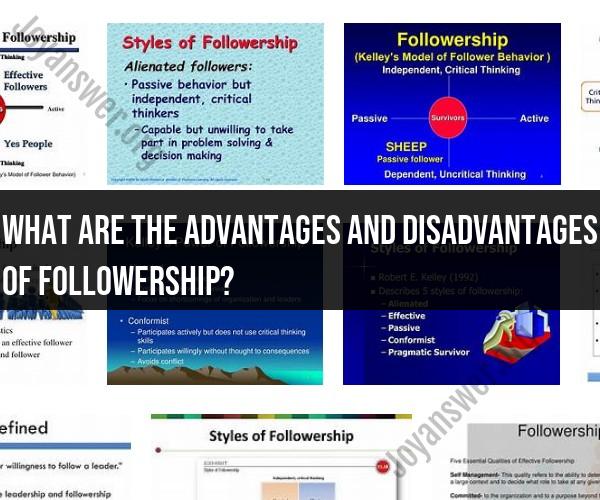What are the advantages and disadvantages of followership?
Followership is an essential component of any group, organization, or team, and it comes with its own set of advantages and disadvantages. Here are the pros and cons of followership:
Advantages of Followership:
Support for Leaders: Effective followers provide support and assistance to leaders, helping them achieve their goals and implement their visions.
Team Cohesion: Good followership fosters a sense of unity and teamwork within a group, leading to better collaboration and synergy among team members.
Enhanced Productivity: Followers who are committed and engaged can contribute significantly to the overall productivity of the group or organization.
Adaptability: Followers are often more flexible and willing to adapt to changing circumstances, which is crucial in dynamic environments.
Skill Development: Followership allows individuals to learn from leaders and colleagues, acquiring new skills and knowledge through observation and experience.
Reduced Conflicts: Effective followership can help reduce conflicts and power struggles within a group, as followers respect and trust their leaders.
Shared Responsibility: Followers often share responsibility for the success or failure of a project or organization, leading to a more balanced distribution of accountability.
Disadvantages of Followership:
Potential for Blind Obedience: Excessive followership can lead to blind obedience, where followers unquestioningly carry out orders without critical thinking or moral judgment.
Stagnation: Overreliance on leaders can stifle creativity and innovation among followers, as they may hesitate to propose new ideas or challenge the status quo.
Passivity: Some followers may become passive or apathetic, contributing little to the group's success and relying too heavily on leaders to make decisions.
Risk of Exploitation: In situations with authoritarian or unethical leaders, followers can be exploited or coerced into actions that go against their principles or values.
Groupthink: Followership can sometimes lead to groupthink, where individuals conform to the group's consensus, even if it's not the best decision.
Dependency: Excessive followership can create a sense of dependency on leaders, making it difficult for followers to take initiative or act independently.
Lack of Accountability: In some cases, followers may blame leaders for failures or shortcomings without taking responsibility for their own actions or decisions.
It's important to note that the effectiveness of followership largely depends on the context, the leadership style, and the qualities of both leaders and followers. In a healthy and balanced dynamic, followership complements leadership, resulting in a well-functioning organization or team. However, it's crucial for followers to maintain a degree of critical thinking, autonomy, and ethical judgment to avoid the potential disadvantages associated with blind followership.












